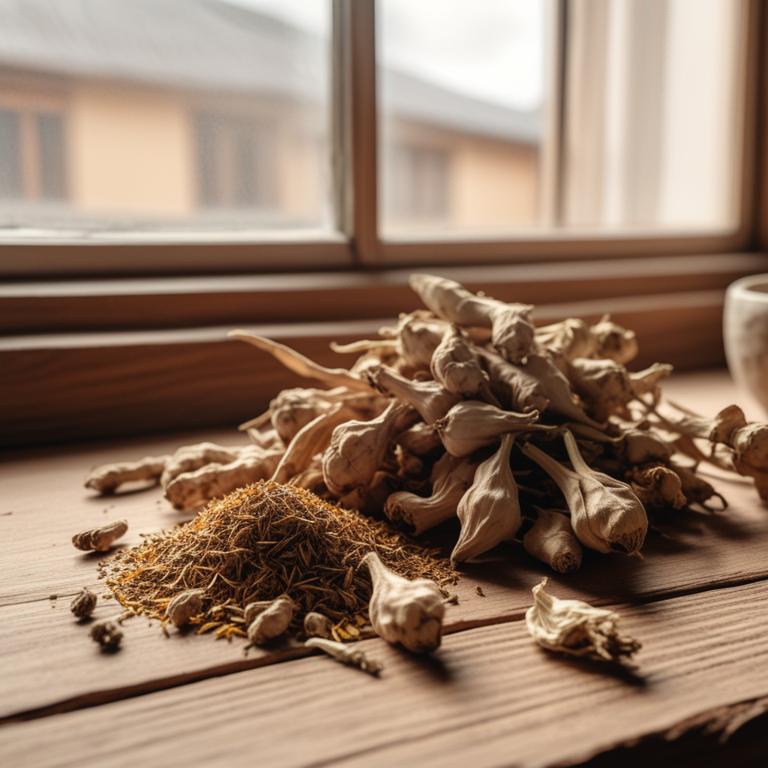Updated: Dec 1, 2024
Brain Fog: A Guide to Causes, Medicinal Herbs, and Natural Preparations

Brain fog is a common phenomenon where you feel mentally sluggish, disorganized, and lacking in focus.
It can make everyday tasks seem overwhelming and impact your productivity and mood. But what causes this mental haze?. Poor sleep, stress, anxiety, and nutritional deficiencies are some of the leading culprits. Dehydration, certain medications, and hormonal imbalances can also contribute to brain fog. Herbal remedies have been used for centuries to alleviate brain fog. Ginkgo biloba, an ancient Chinese herb, improves blood flow to the brain, boosting memory and concentration.
Bacopa monnieri, an Ayurvedic herb, enhances cognitive function and reduces mental fatigue. Ashwagandha, an adaptogenic herb, helps the body adapt to stress, reducing anxiety and promoting a sense of calm. You can incorporate these herbs into your daily routine through various preparations. Ginkgo biloba tea, made by steeping dried leaves in hot water, is a soothing way to stimulate blood flow to the brain. Bacopa monnieri supplements, available in capsule or powder form, can be taken with meals to support cognitive function. Ashwagandha root tea or capsule can be used to reduce stress and promote relaxation.
Some herbal teas, like peppermint and ginger, can also help improve mental clarity and reduce brain fog.
Table of Contents
What are the underlying causes of brain fog?
The main causes of brain fog are related to various factors that affect our body's ability to function properly.
One of the main causes is hypothyroidism, a condition where the thyroid gland doesn't produce enough thyroid hormones. These hormones play a crucial role in regulating our metabolism, energy levels, and brain function. When thyroid hormones are low, it can lead to fatigue, slow thinking, and brain fog. Another cause of brain fog is a vitamin D deficiency. Vitamin D is essential for nerve function and brain health, and a lack of it can cause symptoms such as fatigue, depression, and brain fog. Many people are deficient in vitamin D due to limited sun exposure, a poor diet, or certain medical conditions. Magnesium deficiency is also a common cause of brain fog.
Magnesium is a mineral that plays a key role in many bodily functions, including nerve function and muscle contraction. When magnesium levels are low, it can cause symptoms such as fatigue, muscle weakness, and brain fog. Many people don't get enough magnesium in their diet, which can contribute to a deficiency. Iron deficiency is another cause of brain fog, especially in women who experience heavy menstrual bleeding. Iron is essential for the production of hemoglobin, a protein in red blood cells that carries oxygen to the brain. When iron levels are low, it can lead to fatigue, weakness, and brain fog. Lastly, anemia, a condition characterized by a lack of red blood cells or hemoglobin, can also cause brain fog. When the brain doesn't receive enough oxygen, it can lead to symptoms such as fatigue, weakness, and brain fog.
Anemia can be caused by iron deficiency, vitamin deficiencies, or certain medical conditions.
What are the benefits of using herbal treatments for brain fog?
Using herbs can be a great way to help with brain fog.
These natural remedies can improve focus and concentration by increasing blood flow to the brain. They can also help to reduce stress and anxiety, which can contribute to brain fog.
Some herbs have antioxidant properties, which can protect the brain from damage caused by free radicals. This can help to improve cognitive function and reduce the risk of age-related decline. Additionally, certain herbs have been shown to boost energy levels and enhance mental clarity, making it easier to stay focused and alert.
By incorporating these herbs into your daily routine, you may experience improved memory and learning abilities, as well as enhanced creativity and problem-solving skills.
What are the key medicinal herbs for alleviating brain fog?

If you're experiencing brain fog, you're not alone.
It's a common symptom that can make everyday tasks feel like a struggle. Herbs have been used for centuries to help improve mental clarity and focus. Let's take a look at five herbs that are particularly effective. Bacopa monnieri is one of them. It's an ancient Indian herb that has been shown to enhance memory and cognitive function. It works by increasing the production of a chemical called acetylcholine, which is essential for learning and memory. Another herb that's been studied extensively is Ginkgo biloba. It's a popular choice for improving blood flow to the brain, which helps to reduce brain fog. When blood flow is poor, brain cells can't get the oxygen they need, leading to feelings of fatigue and confusion.
Ginkgo biloba helps to dilate blood vessels and improve circulation, making it easier for brain cells to function properly. Centella asiatica, also known as gotu kola, is an herb that's commonly used in traditional medicine. It's known for its ability to improve memory and cognitive function, and it's also been shown to reduce stress and anxiety. This can be particularly helpful if you're experiencing brain fog due to stress or burnout. Panax ginseng, or Asian ginseng, is another herb that's been used for centuries to improve mental clarity and focus. It's believed to work by improving blood flow to the brain and reducing inflammation, which can help to alleviate brain fog. Finally, there's Ocimum basilicum, or sweet basil. While it's not as well-studied as some of the other herbs on this list, it's been shown to have a positive effect on cognitive function and memory. It's also been used to reduce stress and anxiety, which can help to alleviate brain fog. These herbs can be used individually or in combination to help alleviate brain fog.
However, it's always a good idea to talk to a healthcare professional before starting any new supplements or herbs, especially if you're experiencing persistent or severe symptoms.
Which herbal remedies are commonly used to alleviate brain fog?

Herbal preparations can be really helpful when you're feeling foggy and unclear in the head.
A decoction is a type of herbal preparation where herbs are boiled in water for a long time to bring out their healing properties. This method is great for roots and bark, which are often too hard to infuse in water. Decoctions can be made into teas or taken as a liquid, making them a soothing way to calm brain fog. Herbal tinctures are another popular option. These are liquid extracts of herbs that are usually taken a few drops at a time. Tinctures are made by soaking herbs in a solvent like alcohol or glycerin, which helps to release their active ingredients. This method is perfect for herbs that are too bitter or harsh to consume in large amounts. Tinctures are also easy to carry around and can be added to water or taken straight. Infusions are similar to teas, but they're made by steeping herbs in hot water for a shorter time than decoctions. This method is great for delicate herbs like flowers and leaves, which can lose their potency if boiled for too long.
Infusions are often enjoyed as a relaxing and flavorful beverage that can help to clear brain fog. Herbal capsules are another convenient way to take herbal remedies. They contain dried and powdered herbs that are sealed in a gelatin or vegetable-based capsule. This method is perfect for people who don't like the taste of herbs or prefer to take their supplements in a pill form. Capsules are also easy to swallow and can be taken on-the-go. Finally, herbal teas are a soothing and enjoyable way to calm brain fog. They're made by steeping herbs in hot water for a few minutes, just like infusions. Herbal teas can be sipped on their own or enjoyed with a bit of honey or lemon. They're a great way to unwind and relax, especially when you're feeling overwhelmed or unclear. In terms of specific herbs that can help with brain fog, some popular options include peppermint, ginkgo biloba, and Bacopa monnieri. These herbs have been traditionally used to improve memory, focus, and mental clarity.
However, it's always best to consult with a healthcare professional before trying any new herbal remedies, especially if you're already taking medication or have a pre-existing condition.
Additional Resources:
What herbs may exacerbate symptoms of brain fog?
If you're experiencing brain fog, it's best to steer clear of Valeriana officinalis, commonly known as valerian root.
This herb is a natural sedative, and while it may help with sleep, it can make you feel drowsy and disoriented during the day, which won't help with brain fog. Ephedra sinica, also known as Chinese ephedra, is another herb to approach with caution. It contains a stimulant called ephedrine that can increase alertness, but it can also cause anxiety and jitters, which can exacerbate brain fog. Pausinystalia johimbe, or yohimbe, is a plant that can cause a rapid heart rate and increase blood pressure.
This can be overwhelming for someone who's already struggling with brain fog, as it can make it harder to focus and think clearly. Scutellaria baicalensis, or baical skullcap, is sometimes used as a natural remedy for anxiety, but it can also have a sedating effect. This might seem like a good thing, but if you're already feeling foggy, it can make you feel even more disconnected from your thoughts and surroundings. Cannabis sativa, or cannabis, can have a wide range of effects depending on the individual and the strain. However, it can also cause disorientation, memory loss, and difficulty concentrating, which are all symptoms of brain fog.
If you're already struggling with these issues, using cannabis might not be the best choice.
FAQ
Are there any specific herbs that can prevent brain fog?
Ginkgo biloba is often used to help improve memory and focus, which can be affected by brain fog.
It's believed to increase blood flow to the brain, allowing it to function more efficiently.
Some people also use peppermint to boost mental clarity, as its invigorating scent can help stimulate the mind and reduce fatigue.
Is it safe to use herbal remedies for brain fog during pregnancy?
During pregnancy, it's best to be cautious when using herbal remedies for brain fog.
Some herbs can pass into the baby's bloodstream and cause problems. If you're considering using herbal remedies, make sure to check their safety during pregnancy with reliable sources.
Always prioritize your baby's health and choose trusted products.
Are there any herbs that can reduce the frequency of brain fog?
Ginkgo biloba and bacopa monnieri are two herbs that may help reduce brain fog.
Ginkgo improves blood flow to the brain, while bacopa supports memory and cognitive function.
Some research suggests that these herbs can enhance focus and mental clarity, but more studies are needed to confirm their effects.
Can i combine different herbal remedies for brain fog?
You can combine different herbal remedies for brain fog, but be cautious.
Some herbs can interact with each other. For example, if you take ginkgo biloba to improve memory and passionflower to calm your mind, the combination might make you drowsy. Start with small amounts and see how your body reacts.
Monitor your symptoms and adjust your routine accordingly.
Related Articles

Earache Treatment with Natural Medicinal Herbs and Herbal Remedies

The Role of Medicinal Herbs in Neuritis Prevention and Treatment

Nausea and Its Causes: Herbal Remedies, Medicinal Treatments, and Natural Cures

Overcoming Numbness in Hands with Medicinal Herbs and Herbal Preparations

Managing Difficult Speaking: Medicinal Herbs and Herbal Remedies






